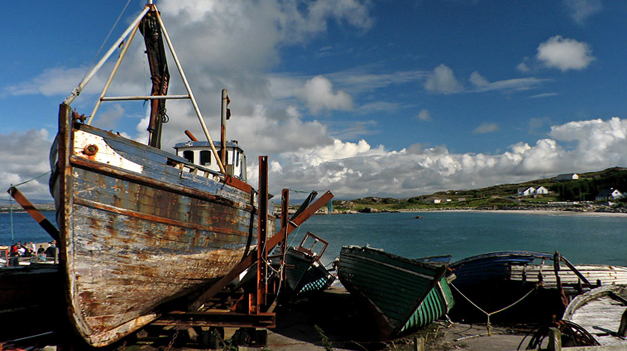
A couple of months ago, courtesy of the Gaia Foundation, I had an opportunity to see something of Earth jurisprudence in practice. A critical aspect of EJ is community ecological governance – the idea that local indigenous people are most likely to know best how to manage their local environment. We went as part of an international delegation to meet the fishing community on Árainn Mhór, a small island off the West coast of Ireland.
The warmth of their welcome more than made up for the bitter cold, although the waters were relatively calm and the skies sunny and deep blue – the photos look like a Mediterranean holiday! The community showed us their thriving community centre, cooperative and life-boat station before explaining to us how fishing bans, mainly by the EU, are destroying their island life. The population has fallen from over 1500 to 540 and there are now so few children on the island that the only schools are threatened with closure which will make family life on the island near to impossible.
Less than 40 of the islanders are now in full time employment and the entire island economy depends on fishing. There is nothing else, although there was some local farming on the island less than a generation ago.
The islanders were first hit by a ban on salmon fishing in 2006 – which they now see as being primarily to protect sports fishing for mainland landowners. They complain that it was the factory trawlers out at sea that were causing shortages, not their small scale operations. They also note that climate change is warming the seas and as salmon are cold water fish, their migration routes are already being affected and fewer salmon now survive in any case. They do see the need for conserving fish stocks, but seriously question whether blanket bans on all forms of fishing (other than mainland sports fishing) is the way to do it when the effect is also to ban people’s livelihoods.
More recently they have also been hit by a ban on all fishing in Atlantic Fishing Zone VIA, which happens to include Árainn Mhór and neighbouring islands as a ‘cod recovery measure’. Now they are not even allowed to fish for bait in local pools – bait which they use for catching lobster, their only remaining alternative catch. Now they have to take a day out to go by sea to buy bait caught by factory trawlers. Meanwhile, the surge in Irish lobster into the European market is disrupting the trade of French fisheries further south.
In considerable sympathy with their plight, the international delegation drafted and adopted the Árainn Mhór Fisheries Declaration set out below. Meanwhile, the EU Common Fisheries Policy is being revised. Despite lengthy submissions and determined campaigning, there is little sign that the Brussels bureaucracy is paying any attention to the needs of such communities.
But the islanders are not giving up. They see the reality: that their traditional way of life has a great deal to offer a world in which climate change and economic forces are bound to require extensive revision of food production systems the world over in the not very distant future.
View the original Árainn Mhór Fisheries Declaration – December 2009







